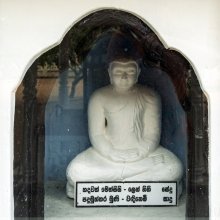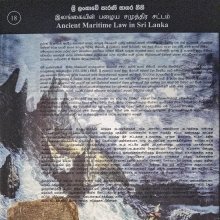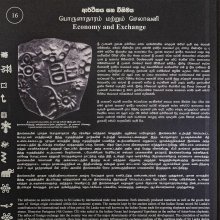Niti, Nīti, Nīṭi, Nitī: 26 definitions
Introduction:
Niti means something in Hinduism, Sanskrit, Buddhism, Pali, Marathi, Hindi, biology, Tamil. If you want to know the exact meaning, history, etymology or English translation of this term then check out the descriptions on this page. Add your comment or reference to a book if you want to contribute to this summary article.
Images (photo gallery)
In Hinduism
Dharmashastra (religious law)
Source: Wisdom Library: Dharma-śāstraNīti (नीति) refers to “polity” (political organization). The word is used throughout Dharmaśāstra literature such as the Manusmṛti. (See the Nītiprakāśikā 8.87)

Dharmashastra (धर्मशास्त्र, dharmaśāstra) contains the instructions (shastra) regarding religious conduct of livelihood (dharma), ceremonies, jurisprudence (study of law) and more. It is categorized as smriti, an important and authoritative selection of books dealing with the Hindu lifestyle.
Purana and Itihasa (epic history)
Source: archive.org: Shiva Purana - English Translation1) Nīti (नीति) refers to “polity”, according to the Śivapurāṇa 2.3.33 (“The appeasement of Himavat”).—Accordingly, as Vasiṣṭha said to Himavat (Himācala): “[...] Statements, in ordinary language and in the Vedas, are of three forms. A scholar knowing all lores understands them by means of his pure vision of knowledge. [...] O mountain, these are the three types of behaviour as mentioned in the treatises on polity (nīti-śāstra). Tell me which type of behaviour shall I adopt to please you. [...]”.
2) Nīti (नीति) refers to the “injunction” (of the Śruti), according to the Śivapurāṇa 2.4.9 (“Boasting of Tāraka”).—Accordingly, as Tāraka-Asura said to the Gods: “[...] Taking birth as Rama he killed a woman (Tāḍakā). Bālī’s death (vidhvaṃsita) was brought about by him with a vile trick. A brahmin descendant of Viśravas was killed by him. Thus he violated the injunction (nīti) of the Śruti. Sinful that he was, he forsook his own innocent wife. There too, he violated the path of Śruti for achieving his selfish end. [...]”.
Source: Cologne Digital Sanskrit Dictionaries: The Purana IndexNīti (नीति).—The policy taught by Śukra to the Asuras and sought by him from Maheśvara;1 according to Bṛhaspati, it commences with sāma for a conquering monarch; other aṅgas are bheda, dāna, and daṇḍa; but the application depends on the place, time and resources of the enemy; in the case of Asuras only daṇḍa can be recommended.2

The Purana (पुराण, purāṇas) refers to Sanskrit literature preserving ancient India’s vast cultural history, including historical legends, religious ceremonies, various arts and sciences. The eighteen mahapuranas total over 400,000 shlokas (metrical couplets) and date to at least several centuries BCE.
Arthashastra (politics and welfare)
Source: Shodhganga: Rajadharma in the MahabharataNīti (नीति) is the very essential part of a king and it is stated by various examples in the first chapter of the Śukranītisāra. The protection of the subjects and destruction of evils are the main duty of a king, which is possible through the proper knowledge of nīti. The king, who has the knowledge of nīti and full of strength, he can attain all prosperity in his life.

Arthashastra (अर्थशास्त्र, arthaśāstra) literature concerns itself with the teachings (shastra) of economic prosperity (artha) statecraft, politics and military tactics. The term arthashastra refers to both the name of these scientific teachings, as well as the name of a Sanskrit work included in such literature. This book was written (3rd century BCE) by by Kautilya, who flourished in the 4th century BCE.
Jyotisha (astronomy and astrology)
Source: Wisdom Library: Brihat Samhita by VarahamihiraNīti (नीति) refers to “ministers”, according to the Bṛhatsaṃhitā (chapter 10), an encyclopedic Sanskrit work written by Varāhamihira mainly focusing on the science of ancient Indian astronomy astronomy (Jyotiṣa).—Accordingly, “If the course of Saturn should lie through the constellations of Śatabhiṣaj and Pūrvabhādra, physicians, poets, drunkards or those that deal in liquor, tradesmen and ministers [i.e., nīti-vṛtti], will be afflicted with miseries; if it should lie through the constellation of Uttarabhādra, dancers, travellers, women and gold will suffer. If the course of Saturn should lie through Revatī, the servants of the reigning sovereigns, the people of Krauñcadvīpa, the crops of Śarat, barbarians and the Yavanas will suffer”.

Jyotisha (ज्योतिष, jyotiṣa or jyotish) refers to ‘astronomy’ or “Vedic astrology” and represents the fifth of the six Vedangas (additional sciences to be studied along with the Vedas). Jyotisha concerns itself with the study and prediction of the movements of celestial bodies, in order to calculate the auspicious time for rituals and ceremonies.
Shaivism (Shaiva philosophy)
Source: Brill: Śaivism and the Tantric TraditionsNīti (नीति) refers to the “(proclaimed) procedure”, according to Kṣemarāja’s commentary on the Svacchandatantra verse 4.142b.—Accordingly, “For the purpose of supernatural powers, from the past pure and impure [karma] that maintains the [current] body he should only purify the impure [portion] for him, for in this way (evam) the achievement of enjoyment comes about without any obstacles. As for the pure and impure [karma] that is accumulated in other [past] births and which he will do in a [future] birth, all those should be purified for him according to the proclaimed procedure (ukta-nīti), like in the case of the Putraka, apart from [those karmas for] the propitiation of mantras. Therefore he said, [prākkarmāgāmi caikasthaṃ bhāvayitvā ca dīkṣayet (Svacchanda 4.142cd)]”.

Shaiva (शैव, śaiva) or Shaivism (śaivism) represents a tradition of Hinduism worshiping Shiva as the supreme being. Closely related to Shaktism, Shaiva literature includes a range of scriptures, including Tantras, while the root of this tradition may be traced back to the ancient Vedas.
Shaktism (Shakta philosophy)
Source: Brill: Śaivism and the Tantric Traditions (shaktism)Nīti (नीति) is another name for Goddess Nityā, according to the King Vatsarāja’s Pūjāstuti called the Kāmasiddhistuti (also Vāmakeśvarīstuti), guiding one through the worship of the Goddess Nityā.—Accordingly, “[...] O mother! Even the kings of gods bow to the feet of those men who have acquired a drop of the grace of seeing you. [...] Mindful men call you Kledanī, Kulakuṇḍalinī, Kā, Nityā, Nīti, Nau, Nāvikā, Vidyā, Saṃvid, Vīśvamayī, Umā, Kāmeśvarī, and Kamalā”.

Shakta (शाक्त, śākta) or Shaktism (śāktism) represents a tradition of Hinduism where the Goddess (Devi) is revered and worshipped. Shakta literature includes a range of scriptures, including various Agamas and Tantras, although its roots may be traced back to the Vedas.
Biology (plants and animals)
Source: Google Books: CRC World Dictionary (Regional names)Niti in Arabic is the name of a plant defined with Cenchrus biflorus in various botanical sources. This page contains potential references in Ayurveda, modern medicine, and other folk traditions or local practices It has the synonym Elymus caput-medusae Forssk., nom. illeg., non Elymus caput-medusae L. (among others).
Example references for further research on medicinal uses or toxicity (see latin names for full list):
· Mémoires de l’Académie des Sciences de Turin (1854)
· Beskrivelse af Guineeiske planter (1827)
· Bulletin of Miscellaneous Information Kew (1933)
· Hortus Bengalensis, or a catalogue … (1814)
· Naturwissenschaftliche Reise nach Mossambique … (1863)
· Flora Aegyptiaco-Arabica (1775)
If you are looking for specific details regarding Niti, for example side effects, extract dosage, pregnancy safety, diet and recipes, health benefits, chemical composition, have a look at these references.

This sections includes definitions from the five kingdoms of living things: Animals, Plants, Fungi, Protists and Monera. It will include both the official binomial nomenclature (scientific names usually in Latin) as well as regional spellings and variants.
Languages of India and abroad
Pali-English dictionary
Source: BuddhaSasana: Concise Pali-English Dictionarynīti : (f.) law; guidance.
Source: Sutta: The Pali Text Society's Pali-English DictionaryNīti, (f.) (Sk. nīti, fr. nīta) guidance, practice, conduct, esp. right conduct, propriety; statesmanship, polity PvA. 114 (°maṅgala commonsense), 129 (°sattha science of statecraft, or of prudent behaviour), 130 (°cintaka a lawgiver), 131 (°naya polity & law), 132 (°kusala versed in the wisdom of life); Miln. 3 (here meaning the Nyāyaphilosophy, cp. Trenckner, Notes p. 58). (Page 375)

Pali is the language of the Tipiṭaka, which is the sacred canon of Theravāda Buddhism and contains much of the Buddha’s speech. Closeley related to Sanskrit, both languages are used interchangeably between religions.
Marathi-English dictionary
Source: DDSA: The Molesworth Marathi and English Dictionarynīti (नीति).—f (S) pop. nīta f Moral philosophy, ethics, the laws and rules for dealing and conduct. 2 Propriety, fitness, justness, equity. 3 The fitness of things, the law of Rectitude, the laws, order, or course of nature. 4 Political ethics or science. 5 (Freely.) Law, limit, definiteness, prescribed amount or quantity. Ex. kiṃvā mēgha dhārā varṣiti || nāhīṃ nīti tyātēṃ ||. Some compounds, more or less serviceable, are dharmanīti, prapañcanīti, lōkanīti, vyavahāranīti, śāstranīti; also aṅgada- kanaka-nārada-bṛhaspati-vidūra-vṛddhacāṇākhya-śukra-nīti.
Source: DDSA: The Aryabhusan school dictionary, Marathi-Englishnīti (नीति).—f nīta f Moral philosophy, ethics. Propriety, fitness. Science. Law, limit, definiteness.
Marathi is an Indo-European language having over 70 million native speakers people in (predominantly) Maharashtra India. Marathi, like many other Indo-Aryan languages, evolved from early forms of Prakrit, which itself is a subset of Sanskrit, one of the most ancient languages of the world.
Sanskrit dictionary
Source: DDSA: The practical Sanskrit-English dictionaryNīti (नीति).—f.
1) Guidance, direction, management.
2) Conduct, manner of conducting oneself, behaviour, course of action.
3) propriety, decorum.
4) Policy, prudence, wisdom, right course; आर्जवं हि कुटिलेषु न नीतिः (ārjavaṃ hi kuṭileṣu na nītiḥ) N.5.13; R.13.69; Kumārasambhava 1.22.
5) A plan, contrivance, scheme; भूयः स्नेहविचेष्टितैर्मृगदृशो नीतस्य कोटिं पराम् (bhūyaḥ snehaviceṣṭitairmṛgadṛśo nītasya koṭiṃ parām) Mālatīmādhava (Bombay) 6.3.
6) Politics, political scicence, statesmanship, political wisdom; आत्मोदयः परग्लानिर्द्वयं नीतिरितीयती (ātmodayaḥ paraglānirdvayaṃ nītiritīyatī) Śiśupālavadha 2.3; दण्डो दमयतामस्मि नीतिरस्मि जिगीषताम् (daṇḍo damayatāmasmi nītirasmi jigīṣatām) Bhagavadgītā (Bombay) 1.38.
7) Righteousness, moral conduct, morality.
8) The science of morality, morals, ethics, moral philosophy; निन्दन्तु नीति- निपुणा यदि वा स्तुवन्तु (nindantu nīti- nipuṇā yadi vā stuvantu) Bhartṛhari 2.83.
9) Acquirement, acquisition.
1) Giving, offering, presenting.
11) Relation, support.
Derivable forms: nītiḥ (नीतिः).
Source: Cologne Digital Sanskrit Dictionaries: Edgerton Buddhist Hybrid Sanskrit DictionaryNīti (नीति).—f. (seems not used in quite this sense elsewhere), management, control, and so object of management, thing under control: sarvā eṣā bodhisattvānāṃ nīti Mahāvastu i.135.4; sarvāṇy etāni bo° nītiḥ 9 (prose).
Source: Cologne Digital Sanskrit Dictionaries: Shabda-Sagara Sanskrit-English DictionaryNīti (नीति).—f.
(-tiḥ) 1. Guiding, directing. 2. Obtaining, acquirement, acquisition. 3. Polity, political science, treating especially of the administrating of government, including the practice of morality in private life, both by the sovereign and his subjects. E. nī to guide or gain, aff. ktin.
Source: Cologne Digital Sanskrit Dictionaries: Benfey Sanskrit-English DictionaryNīti (नीति).—[nī + ti], f. 1. Guidance. 2. Moral behaviour, Sāh. D. 489. 3. Prudent behaviour, Mahābhārata 1, 7612. 4. Prudence, [Yājñavalkya, (ed. Stenzler.)] 1, 316. 5. A prudent counsel, [Raghuvaṃśa, (ed. Stenzler.)] 12, 69. 6. Policy, [Mānavadharmaśāstra] 7, 177. 7. Relation, support, Mahābhārata 3, 1292.
Source: Cologne Digital Sanskrit Dictionaries: Cappeller Sanskrit-English DictionaryNīti (नीति).—[feminine] conduct, [especially] right or wise conduct; also = nītividyā q.v.
Source: Cologne Digital Sanskrit Dictionaries: Monier-Williams Sanskrit-English Dictionary1) Nīti (नीति):—[from nī] f. leading or bringing, guidance, management, [cf. Lexicographers, esp. such as amarasiṃha, halāyudha, hemacandra, etc.]
2) [v.s. ...] conduct, ([especially]) right or wise or moral c° or behaviour, prudence, policy (also personified), political wisdom or science, moral philosophy or precept (also [plural]), [Manu-smṛti; Mahābhārata; Kāvya literature] etc.
3) [v.s. ...] relation to, dependence on (itaretarayoḥ), [Mahābhārata]
4) [v.s. ...] presenting, offering (?), [Pāṇini 5-3, 77]
5) [v.s. ...] acquirement, acquisition, [Horace H. Wilson]
Source: Cologne Digital Sanskrit Dictionaries: Yates Sanskrit-English DictionaryNīti (नीति):—[nī-ti] (tiḥ) 2. f. Guiding; obtaining; polity, policy, ethics.
Source: DDSA: Paia-sadda-mahannavo; a comprehensive Prakrit Hindi dictionary (S)Nīti (नीति) in the Sanskrit language is related to the Prakrit word: Ṇīi.
[Sanskrit to German]
Sanskrit, also spelled संस्कृतम् (saṃskṛtam), is an ancient language of India commonly seen as the grandmother of the Indo-European language family (even English!). Closely allied with Prakrit and Pali, Sanskrit is more exhaustive in both grammar and terms and has the most extensive collection of literature in the world, greatly surpassing its sister-languages Greek and Latin.
Hindi dictionary
Source: DDSA: A practical Hindi-English dictionaryNīti (नीति):—(nf) policy; expediency; morality, ethics; —[kāvya] didactic poetry; ~[kuśala/catura/nipuṇa] politic; sagacious; ~[mattā] adherence to ethical laws; ~[māna] one who knows and follows ethical laws, just and fair; -[vidyā/śāstra] ethics, the science of morality.
...
Kannada-English dictionary
Source: Alar: Kannada-English corpusNīti (ನೀತಿ):—
1) [noun] a carrying or conveying.
2) [noun] the act or process of guiding.
3) [noun] the direction provided by a guide.
4) [noun] moral quality or character; rightness or wrongness, as of an action.
5) [noun] the character of being in accord with the principles or standards of right conduct; right conduct.
6) [noun] principles of right and wrong in conduct; ethics.
7) [noun] moral instruction or a moral lesson.
8) [noun] political methods, tactics, etc., including crafty or unprincipled methods; politics.
9) [noun] a carefully arranged and systematic program of action for attaining some object or end.
10) [noun] a principle, plan or course of action, as pursued by a government organisation, individual, etc.
Kannada is a Dravidian language (as opposed to the Indo-European language family) mainly spoken in the southwestern region of India.
Tamil dictionary
Source: DDSA: University of Madras: Tamil LexiconNiti (நிதி) noun < nidhi.
1. Treasure-hoard; பொருட்டிரள். பெருநல நிதி தலைசிறந்து [poruttiral. perunala nithi thalaisiranthu] (சீவகசிந்தாமணி [sivagasindamani] 331).
2. Gold; பொன். (சூடாமணிநிகண்டு) [pon. (sudamaninigandu)]
3. Joint-stock company; ஐக்கிய நாணயச்சங்கம். [aikkiya nanayachangam.] Mod.
--- OR ---
Nīṭi (நீடி) [nīṭittal] 11 intransitive verb < நீடு-. [nidu-.]
1. To lengthen time, distance, etc.; நீளுதல். ஆயுசு நீடிக்கிறது. [niluthal. ayusu nidikkirathu.]
2. To endure, last; to be permanent; நிலைநிற்றல். [nilainirral.] (W.)
--- OR ---
Nīṭi (நீடி) noun < idem. Omnipresence; விபுத்து வம். தேய நீடி யில்லாமைபோல் [viputhu vam. theya nidi yillamaipol] (ஞானவாசிட்டம் லீலை. [gnanavasittam lilai.] 32).
--- OR ---
Nīti (நீதி) noun < nīti.
1. Equity, justice; நியாயம். நீதியாவன யாவையு நினைக்கிலேன் [niyayam. nithiyavana yavaiyu ninaikkilen] (திருவாசகம் [thiruvasagam] 26, 2).
2. Discipline; முறைமை. கட்டமை நீதிதன்மேற் காப்பமைந்து [muraimai. kattamai nithithanmer kappamainthu] (சீவகசிந்தாமணி [sivagasindamani] 1145).
3. Right conduct, morality; ஒழுக்கநெறி. நீதியா லவர்கடம் மைப் பணிந்து [ozhukkaneri. nithiyanusandanam lavarkadam maip paninthu] (பெரியபுராணம் தடுத்தாட். [periyapuranam thaduthad.] 197).
4. Truth; மெய். (பிங்கலகண்டு) [mey. (pingalagandu)]
5. Conformity with the ways of the world; உலகத்தோடு பத்துப்பாட்டு: பொருநராற்றுப்படை்துகை. [ulagathodu porunthugai.] (திருக்குறள் [thirukkural] 97, உரை. [urai.])
6. Nature; இயல்பு. ஊர்தியிற் சேறலு நீதி யாகும் [iyalpu. urthiyir seralu nithi yagum] (அகப்பொருள் விளக்கம் [agapporul vilakkam] 83).
7. Law; தருமசாஸ்திரம். உணர்ந்தாய் மறைநான்கு மோதினாய் நீதி [tharumasasthiram. unarnthay marainanku mothinay nithi] (நாலாயிர திவ்யப்பிரபந்தம் இயற். [nalayira thivyappirapandam iyar.] 2, 48).
8. That which guides; நடத்துவது. [nadathuvathu.] (சிவஞானபோத பாஷ்யம் பக். [sivagnanapotha pashyam pag.] 20, சுவாமிநா. [suvamina.])
9. Means, contrivance; உபாயம். உலகமெல்லா மாண்டிட விளைக்கு நீதி [upayam. ulagamella mandida vilaikku nithi] (சீவகசிந்தாமணி [sivagasindamani] 755).
10. Pārvatī; பார்வதி. [parvathi.] (கூர்மபுராணம் திருக். [kurmapuranam thirug.] 21.)
Tamil is an ancient language of India from the Dravidian family spoken by roughly 250 million people mainly in southern India and Sri Lanka.
Nepali dictionary
Source: unoes: Nepali-English Dictionary1) Nitī (निती):—n. policy;
2) Nīti (नीति):—n. 1. manner of conducting oneself; 2. right/moral conduct; morality; 3. ethics; 4. prudent; counsel; policy; polity; 5. political wisdom; statesmanship;
Nepali is the primary language of the Nepalese people counting almost 20 million native speakers. The country of Nepal is situated in the Himalaya mountain range to the north of India.
See also (Relevant definitions)
Starts with (+21): Nitibahira, Nitibahirate, Nitibahire, Nitibahya, Nitibhrashta, Nitibhrashtate, Nitibhrashte, Nitibhrit, Nitibija, Nitibodhaka, Nitibodhe, Niticanakya, Niticintamani, Nitidipika, Nitidosha, Nitighosha, Nitihina, Nitihine, Nitijada, Nitijna.
Query error!
Full-text (+2009): Nidhi, Rajaniti, Aniti, Nitishastra, Dandaniti, Suniti, Nitijna, Samnidhi, Nitividya, Jalanidhi, Upanidhi, Kuniti, Nitighosha, Kalanidhi, Ambhonidhi, Nitikushala, Nitivakyamrita, Pratinidhi, Durniti, Abhiniti.
Relevant text
Search found 157 books and stories containing Niti, Needi, Neethi, Ni-ti, Nī-ti, Nidhi, Nidi, Nithi, Nīti, Nīṭi, Nitī; (plurals include: Nitis, Needis, Neethis, tis, Nidhis, Nidis, Nithis, Nītis, Nīṭis, Nitīs). You can also click to the full overview containing English textual excerpts. Below are direct links for the most relevant articles:
Markandeya Purana (by Frederick Eden Pargiter)
Canto LXVIII - A description of the Nidhis
Canto CXXV - Avīkṣita’s exploits (continued)
Garuda Purana (by Manmatha Nath Dutt)
Chapter LIII - Traits of conduct of men marked by the several kinds of Nidhis < [Agastya Samhita]
Chapter XXVIII - The mode of worshipping the Gopala Manifestation of Vishnu < [Agastya Samhita]
Chapter XXXIV - Hayagriva worship < [Agastya Samhita]
Notices of Sanskrit Manuscripts (by Rajendralala Mitra)
Padmini-Vidya < [Purana, Volume 1, Part 2 (1960)]
Artha and Arthasastra in the Puranic Iconography < [Purana, Volume 9, Part 2 (1967)]
Puranic Wise Sayings in the Literature of “Greater India” < [Purana, Volume 11, Part 1 (1969)]
Pallava period (Social and Cultural History) (by S. Krishnamurthy)
Vaikakshaka or Chhannavira < [Chapter 4 - Material Culture of the People]
Other Gods and Goddesses < [Chapter 3 - Socio-Religious Life]
Rig Veda (translation and commentary) (by H. H. Wilson)
Related products





